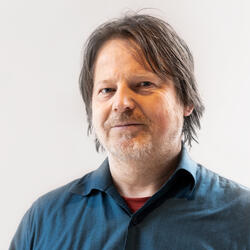Markus Berger

Markus Berger is an artist, designer, writer, researcher and, above all, an educator. He is a registered architect (SBA, Netherlands) and the founder and director of The Repair Atelier, a collaborative space dedicated to creatively rethinking and reusing discarded and damaged materials, objects and spaces. Berger’s work critically examines repair, the circular economy and waste streams as both a conceptual framework and a practical method for innovative reuse, responsible remaking and sustainable transformation of everyday environments.
Berger earned his Diplomingenieur für Architektur from the Technische Universität Wien, Austria. Since then, he has lived, taught and worked internationally, experiences that deeply informed his ethical, aesthetic and cultural perspectives. His research, writing and teaching critically examine traditional architectural practices, emphasizing how artistic and design interventions can drive positive, sustainable transformations within the built environment.
He co-founded and co-edited Int|AR: The Journal on Interventions and Adaptive Reuse (2009–29) and co-edited the influential volumes Intervention and Adaptive Reuse: A Decade of Responsible Practice (Birkhäuser, 2021) with L. Wong, and Repair: Sustainable Design Futures (Routledge, 2024) with K. Irvin. Berger also serves on the editorial board of INTERIORITY (Indonesia).
At RISD, Berger co-coordinates the undergraduate concentration in Nature–Culture–Sustainability Studies (NCSS) and teaches the year-long Sustainability Lab, The Remainder, which investigates innovative uses of waste fibers.
Together with Assistant Professor of Industrial Design Ayako Maruyama, Berger initiated reharvest repair, a circular economy research project awarded a 2024 Somerson Sustainability Innovation Fund grant. This initiative explores two interconnected pathways: re-harvesting, documenting and networking material waste streams from Rhode Island industries; and re-pair, creatively reimagining these recovered resources in collaboration with students and community partners.
Academic areas of interest
Forms of modification, transformation, intervention, reuse and repair are central to Berger’s research and work as an artist, architect, designer, editor and writer. Taking over something already existing (an ordinary object or another work of architecture or art) to make a new work initiates a whole set of radical potentialities. Repair and reuse unsettles ideas of single authorship, originality and authenticity established by traditional art history, and putting the “old” and the “new” together in inventive configurations sets into motion the many possibilities of recontextualization. Berger’s current work through the Repair Atelier engages discarded spaces, buildings, objects and materials by deconstructing and reinterpreting them to find new meaning, form and expression, rather than seeing them as unwanted or broken. The initial forms, uses and stories of these objects, as well as what was lost from them when they were discarded, are a central part of this critical inquiry. The process of reconstruction or remaking responds to these stories and inquiries and imbues each of them with an identity that is both its own as well as one shaped by the new and vital relationship.